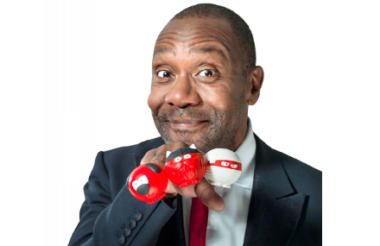Fundraisers should avoid patronising people in their portrayals and let them tell their own story instead, Sir Lenny Henry said yesterday.
Speaking at the opening plenary of the Chartered Institute of Fundraising (IoF)’s annual convention, Sir Lenny Henry, comedian and co-founder of Comic Relief, talked about a range of topics, including the charity’s impact since it was founded, diversity in the charity sector and storytelling.
Involving people in the storytelling
Asked about what makes an engaging story that encourages people to donate, he cited “immersing people in a story” and “not patronising people" with storytelling. He added that the audience is very “tele-literate”, and that fundraisers should “respect the audience's ability to understand the story”.
He said: “I think this idea of ‘famine porn’, of having to present the subject of your charity rather than allowing them to tell the story, is perhaps over now. We don't really need to see a child with flies on their face to know that that child needs help.
“You could involve the subject more in the storytelling. If somebody undergoing chemo tells us what chemo is like, I'm more moved by that, than by just having a camera on that person, and somebody posh telling me that this is a really important story, and we must give as much money as we can.”
He said that fundraisers have been guilty of doing that in the past, and that the films that have stood out in Comic Relief in the past 15 years have been the ones where people have been on camera instead.
Your team needs to reflect your community
Sir Lenny was also asked about diversity and inclusion in the sector, and said that people on charities' boards need to make sure they represent the community they are serving.
He said: “You just need to look around, look at your office and look at who works with you. Then look at the community that you're serving and try and match up whether your team reflects what's happening beyond your doors. If it isn't variegated, you need to air it, you need to change things.
“It's a matter of reaching out to your community, looking at the people that are there and getting them on board, or in terms of consultative practice, just going out and asking questions. It's really important to ask questions to your community: how can we serve you? How can we include you in what we do?”
Asked what he would do differently if he were to found Comic Relief now, he said that he would do the same things, but make it more inclusive from the beginning.
He said: “I think that we wouldn't change anything really. Of course, we'd make it more diverse immediately, while that has happened over the years. People are more woke now and more educated onto that. But apart from that, we’d start with the same energy, the same commitment, the same will to change things. I wouldn't change it, just make it more inclusive.”
Compassion fatigue is a ‘misnomer’
On the Covid-19 crisis, he said that it has really united the country, and mentioned Clap For Carers, Colonel Tom, and Comic Relief and BBC Children In Need’s Big Night In appeal as examples of it.
He said: “It just showed me that the whole thing of compassion fatigue that people keep tossing at us is a kind of misnomer. It's not true. When we see a problem that affects us, we come together and we try and fix it. We try and help. We don't turn our backs.
“We came together, we said ‘we're all in this together’. I think that as long as we keep doing that, as long as we keep coming together, we'll get through this.”











